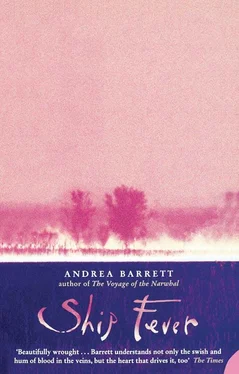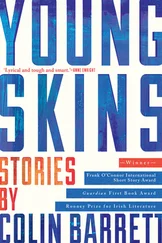Dr. Sepulveda cradled the camera in his left hand as he explained how one of the men had died of smallpox while the other, whom FitzRoy had named York Minster, survived. The girl, named Fuegia Basket, thrived, and so did the boy, called Jemmy Button after his purchase price. “They learned a good deal of English,” the doctor said. “They adopted English dress and were quite the wonder of London for a while. The queen met them and gave Fuegia Basket a ring.”
But the Fuegians weren’t happy, the doctor said, and FitzRoy was no longer sure that he’d done the right thing in taking them from their native land. And so when he set off on his second voyage — the one on which Darwin was present — he carried the Fuegians with him, along with a missionary and a huge store of goods donated by a missionary society. He had hopes that Jemmy and Fuegia and York might teach their tribes to welcome Englishmen. Then a shipwrecked sailor or a passing stranger might not have to fear for his life.
“Darwin was quite a young man then,” the doctor said. “Your age, maybe a little younger — twenty-three, twenty-four. He found the Fuegians very interesting and was particularly fond of Jemmy Button, whom he describes as sweet-tempered and amusing. He expected a great reunion when they finally came on Jemmy’s tribe, but the tribe was hostile and unwelcoming. Jemmy, who had forgotten how to speak his own language, had changed so much that his family hardly recognized him.
“FitzRoy’s crew unloaded the gifts of the missionary society and showed the members of Jemmy’s tribe how to use a shovel and a hoe,” Dr. Sepulveda said. “Then they packed up and went off to do some botanizing. They left Jemmy behind, along with the missionary and York and Fuegia. A few weeks later they returned to find the gifts demolished and scattered among the tribe. York and Fuegia were all right, but Jemmy was miserable and the missionary, who was terrified, gave up his plans and sailed off with the Beagle when it left again.”
The story made Zaga restless, as did the camera glinting darkly in Dr. Sepulveda’s hand, but he seemed compelled to go on talking. In his journal, the doctor said, Darwin recorded his suspicions that Jemmy would have been glad to rejoin the ship along with the missionary. He’d been civilized, he noted; perhaps he would have liked to retain his new habits.
A year later, when the Beagle returned to the area, a canoe headed out to greet the ship. A long-haired man wearing nothing but a scrap of sealskin was washing the paint from his face while a woman paddled. No one recognized the man until he hailed FitzRoy and Darwin, and then they saw that this ragged stranger was the Jemmy they’d left, plump and clean and clothed, all those months ago.
He still remembered the English he’d learned and he told FitzRoy and Darwin that he was very happy now. He had plenty to eat, he had found a wife, he liked his family. And although York and Fuegia had run away with the few belongings his tribe hadn’t already taken, he claimed to be content.
Jemmy gave FitzRoy an otter skin and Darwin a pair of spearheads. Then he returned to his canoe and paddled away. When he reached the shore he lit a bonfire. The last sign Darwin saw of him was the long and wistful column of smoke outlined against the horizon.
Dr. Sepulveda paused and sipped his coffee. In the Andes, he explained, Darwin had mused on the story of Jemmy Button, and so had he. Before Zaga could smile, he held the camera in front of his face and clicked the shutter: “For your baby,” he said. He gestured toward her waist and spoke a few words in Spanish; perhaps he addressed her child. Then he said, “Think of that. Jemmy Button: captured, exiled, re-educated; then returned, abused by his family, finally re-accepted. Was he happy? Or was he saying that as a way to spite his captors? Darwin never knew.”
Zaga imagined how she might look through his lens, surrounded by wealthy skiers from France and Spain, California and Brazil. Small, slight, insignificant. Ill-bred and poorly educated. “Are you happy?” she asked the doctor. He replied, “Are you?”
Despite her promise to Marianna, Zaga continued to give money away. It was a fever that came over her. It was a burning in her fingertips, which could only be relieved by writing checks. She gave money to the Girl Scouts, the Boy Scouts, the Shriners, Kiwanis. Her money seemed like a dead skin, and the more she shed the better she felt. “Visit lawyer,” she wrote on her list of things to do. “Set up college funds for the kids.” But meanwhile she gave to political candidates, medical research foundations, slim girls in jeans begging funds to save the whales. Her list was still by the phone when Rob called. It was the first time she’d heard from either him or Alicia since her move.
“How are you doing?” he asked her. “How do you like your new place?” As if her efforts to mother him had worked, as if they were actually close. He told her how his job was going and then said he had a friend who very much wanted to meet her. His name was Nicholas Bennett; Joel had known him and had thought the world of him. Nicholas had something he wanted to discuss with Zaga. Would she see him? She said she would.
A week later she met Nicholas for lunch in the museum cafe. He was tall, as he’d said over the phone, and lean and dark-haired; he was younger than Zaga, with interesting planes between his cheekbones and the crisp line of his jaw. When she spotted him at his table in the corner he rose to greet her.
Over a salad of ripe pears and Roquefurt he offered his condolences and told her how much he’d admired Joel. For an hour she waited to learn why he’d wanted to speak to her, but instead the conversation eddied pleasantly around Joel and common acquaintances and the situation at the museum. “You were right,” Nicholas told her. “To give them the funds. Joel would have wanted those paintings hung properly.” Zaga had two glasses of Chardonnay and when Nicholas asked her about her family she told him more or less the story she’d told Dr. Sepulveda years ago.
Nicholas said, “Really?” and smiled at her. His teeth were white and charmingly uneven. By the time he finally, casually, mentioned what must have been his real purpose in seeing her, she had entirely lost sight of the fact that he wanted something. The light coming in through the high, arched windows was gentle and everyone else had left the café. Nicholas was absurdly young, he was barely thirty. She was not so much attracted to him as she was warmed and flattered by the image of her younger self she saw in his eyes. He explained how he’d recently purchased the rights to an excellent new drug.
He was starting up a company to market it, he said. A few people, some savvy investors, would be helping him get started; once the drug hit the market and the stock went public the profits would be staggering. As she listened to him, she thought how she still had too much money sitting in dead investments instead of building something new and vital. By the time the first tired museum-goers had wandered in for afternoon tea, she had convinced Nicholas to let her invest with him.
“I couldn’t let you do that,” he said at first. “There’s some risk involved, I’m not sure Joel would have approved.” He was bashful, reluctant; he dragged his feet and nearly blushed.
“Joel’s dead,” she said. “It’s my decision.” Even then, she may have understood what was bound to happen.
He brushed her hand and said, “I wouldn’t feel right.”
“Please,” she said. “I insist.”
That night, alone in her clean bed, she dreamed of Dr. Sepulveda. In his white shirt and silk scarf and elegant pleated pants he led her outside the hotel and around the lake, where they met three mules loaded with blankets and food and cooking utensils and hardware. There was a mare with a bell around her neck, but she was not for riding: she was the madrina, Dr. Sepulveda explained, the steady mother who led the mules. Dr. Sepulveda wrapped Zaga’s feet in enormous boots and then led her to a pass between the peaks.
Читать дальше
Конец ознакомительного отрывка
Купить книгу












